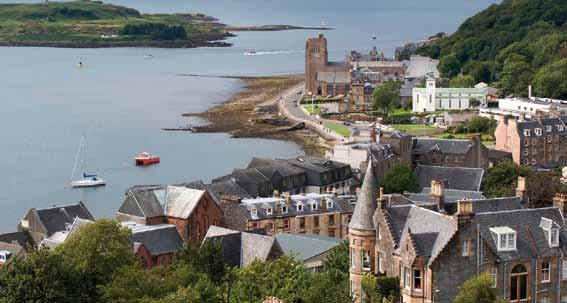
5 minute read
IGU Global Gas Award 2015-2018
by IGU
By Lee Gale
v Angus McIntosh
receiving the IGU Global Gas Award 2015 from Maria van der Hoeven, then Executive Director of IEA and member of the Judging Panel.
Established in 2008, the IGU Global Gas Award is a hotly contested competition that takes place over a three-year period. The winner is announced at the World Gas Conference (WGC). It recognises a groundbreaking project that best demonstrates an understanding of the many in-depth challenges facing the natural gas sector. IGU considers that research must work towards a more sustainable energy future, reducing greenhouse gas emissions and increasing security of supply.
In the run up to a WGC, an IGU Judging Panel studies entrants’ projects and after much deliberation, finds a submission that best displays innovation while contributing to the gas industry on both a regional and global basis. The Judging Panel includes: the IGU President, IGU Secretary General, IGU Coordination Committee Chair, IGU Wise Persons and Regional Coordinators. The Global Gas Award has a number of
objectives that a winning project must demonstrate. These include a contribution to the progress of the gas industry that promotes innovation and sustainability, a furthering of technical know-how that can be transfered to other regions, and the raising of IGU’s profile on the global stage through media coverage. How natural gas benefits society while overcoming challenges are key ingredients of a successful submission.
The winner for the 2012-2015 triennium was SGN, a UK operator of 74,000km of gas mains in Scotland and the south of England. Its Opening up the Gas Market paper was written by Angus McIntosh, Jamie McAinsh, Richard Mason and Caroline Geddes. SGN’s Opening up the Gas Market project demonstrated that gas which meets the European Association for the Streamlining of Energy Exchange-gas (EASEE Gas) specification, but sits outside the characteristics specified within GB Gas Safety (Management) Regulations (GS(M)R) 1996, can be distributed and utilised safely and efficiently in Britain. As part of its work, SGN used one of its isolated networks that it operates in remote parts of Scotland, known as the Scottish Independent Undertakings.
The main aims of Opening up the Gas Market were to secure a reliable gas source while supporting energy diversity, to be low carbon so as to be consistent with stringent legally binding carbon targets and, crucially, provide customers with an affordable service. Oban on the west coast of Scotland, with its own independent gas distribution network, was an ideal setting for SGN’s trials. Oban is also, statistically, a microcosm of Britain: it was discovered that 1,104 gas-supplied
homes roughly contained the full range of appliances that can be found in a wider context in Britain. The project was a pioneering one for the UK and paved the way for new sources of gas which support energy diversity and supply security. See feature article, pages 162-166, International Gas, October 2015-April 2016.
For the 2015-2018 triennium, the theme of the Global Gas Award is “Call for the Role of Natural Gas in Enhancing the Quality of Life, Today and in the Future”. A call for papers is to be launched on April 5, 2017. An initial screening of entrants will be carried out by the IGU Coordination Committee, Presidency and Secretariat. Next January, an Evaluation Committee will choose a shortlist of finalists. This Committee is formed of: the IGU Director; Acting Chair, Coordination Committee; Chair, Strategy Committee; Chair, Markets Committee; Chair, Sustainability Committee; Chair, Marketing and Communications; and Senior Advisor, USA Presidency. Further assessment will then be made by the IGU Judging Panel and their thoughts passed to IGU’s Management Committee and the World Gas Conference 2018 Steering Committee.
For such an esteemed competition, the judging criteria has to study a number of factors. The project must be relevant to the development of the gas industry and contribute to the advocacy of natural gas. It also has to improve quality of life and tackle issues of climate change and air pollution. Increasing the competitiveness of the industry is also viewed favourably, as is a world-class demonstration of gas industry knowledge. The winning entrant must also have a long-term element, with natural gas placed prominently in the future energy mix.
The winner will be announced at WGC 2018 in Washington DC at a special Global Gas Award session, and details will also be made available via IGU’s newsletter, magazine and website. For the finalists, an IGU token of appreciation will be made, which includes an IGU diploma and an invitation to the Award ceremony. The winning entrant may be invited to showcase their findings during a specially arranged WGC session. Winners also receive free entry to WGC 2018, with free travel and accommodation to Washington DC and a prize of $5,000. The deadline for entries is September 1, 2017.
Lee Gale is Editor-in-Chief at International Systems and Communications Ltd.

c Oban in Scotland proved
a perfect testing ground for SGN’s project.
TAP:
CONSTRUCTION IS UNDERWAY
The Trans Adriatic Pipeline (TAP) is a strategic energy project. Once completed, it will bring an initial 10bcm/a of Caspian gas to Europe. 878km long, the pipeline crosses northern Greece, Albania and the Adriatic Sea, before reaching southern Italy.
In line with the Energy Union’s energy security pillar, TAP’s realisation paves
providing a new source of supply and a
Moreover, TAP will facilitate gas supply to regions where it is most needed, meeting the energy security and energy demand needs of South East Europe, a region
the most vulnerable to supply disruptions and external shocks. Besides its valuable contribution to energy
role in the decarbonisation of economies, particularly in South East Europe and the Western Balkans where the energy sector is overly reliant on the use of heavy fossil fuels for power generation. In the face of declining domestic production and Europe’s steady import dependency, natural gas supplied by TAP will provide a sound alternative to use of coal (and sometimes wood) for home heating in countries where up to 60% of the
Much more than just an energy project, TAP is contributing to local economies across the value chain, through direct and indirect jobs and projects stemming from TAP’s social and environmental investment framework. As of early December 2016, TAP’s construction was well underway: 205km along our route have already been cleared, 125km line pipes welded and 95km lowered in.
TAP is a key project on Europe’s energy landscape, helping to ensure the security
decades to come.
UlrikeAndres Commercial and

TAP construction activities near Alexandroupoli, Greece, September 201 6










